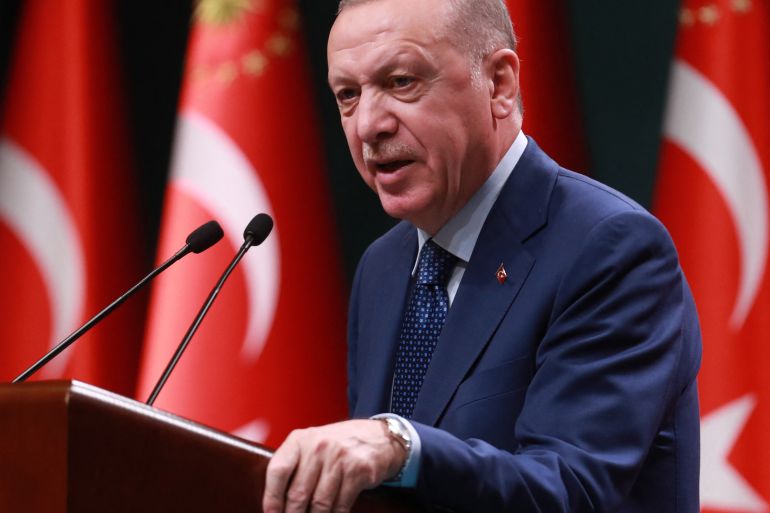Turkey: Erdogan accuses retired admirals of hinting at ‘coup’
Turkish president slams former naval officers who warned his plans for a new Istanbul canal threaten a maritime treaty.

Turkish President Recep Tayyip Erdogan said a statement by former admirals warning that his plans for a new canal in Istanbul put the Montreux Convention maritime accord in jeopardy was hinting at a “political coup”, though he added he was committed to the pact.
Earlier on Monday, Turkish prosecutors detained 10 retired admirals and ordered four others to turn themselves in for signing the statement supporting the 85-year-old maritime accord governing the use of the Bosphorus and Dardanelles straits on grounds they were conspiring against the constitutional order.
Keep reading
list of 4 itemsTurkey condemns warning by retired admirals over Bosphorus treaty
Turkey’s Canal Istanbul dispute explained
Turkey reports record daily COVID-19 cases
Officials said their declaration, signed by more than 100 former high-ranking navy personnel, was a direct challenge to civilian government and evoked past army interventions
The suspects were detained at their homes in Ankara, Istanbul and Kocaeli, and were to be questioned by the chief prosecutor’s office in the capital.
“The duty of retired admirals – 104 of whom come together – is not to publish declarations that hint at a political coup,” Erdogan said on Monday.
“It is under no circumstances acceptable for 104 retired admirals to make such an attempt in the middle of the night in a country whose history is full of coups and memoranda. We cannot call this freedom of speech.”
The military staged three coups between 1960-1980 and, with a statement by the National Security Council, pressured the first Islamist-led government out of power in 1997. Another coup was attempted in 2016.
Officials last month approved a project to develop a new 45km (28-mile) shipping lane – linking the Black Sea to the Mediterranean – comparable to the Panama or Suez canals but it has raised questions over Turkey’s commitment to the Montreux Convention.
The 1936 pact is aimed at demilitarising the Black Sea by setting strict commercial and naval rules on passage through the Bosphorus and Dardanelles straits leading to the Mediterranean.
The retired admirals worry that the new canal’s construction would result in Turkey abandoning the treaty, angering Russia and losing its neutrality in the volatile region.
“We are of the opinion to refrain from any kind of rhetoric or action that could make the Montreux Convention … a matter of controversy,” they said.

Erdogan said it was “completely wrong” to link the proposed canal to the treaty.
“We currently have neither any efforts nor intention to leave the Montreux Convention,” he said.
But he added that the proposed canal “will reinforce our sovereignty”, hinting that Turkey could withdraw from the pact at a later date.
“But if the need emerges in the future, we could revise every convention to help our country get better.”
Kanal Istanbul (Istanbul Canal) is the most ambitious of what Erdogan calls his “crazy projects”, which have seen him building new airports, bridges, roads and tunnels during his 18 years in power.
The Turkish defence ministry said the admirals’ letter had “no purpose other than undermining our democracy”.
“They [the admirals] should know that our esteemed nation and its representatives will never allow this mentality,” presidential spokesman Ibrahim Kalin said on Twitter.
The main opposition Republican People’s Party said the government sought to distract from more critical issues, including a shock 12 percent lira depreciation two weeks ago, and record daily coronavirus cases. Erdogan blamed the opposition for the statement.